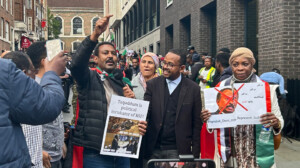UN 16 Days of Activism Against Gender-Based Violence ends in Sudan
At a closing event of the UN 16 Days of Activism Against Gender-based Violence campaign in Sudan this Thursday, Dr Asma Abakar, director of the El Kandaka humanitarian aid organisation, called for ‘‘solidarity’’ and ‘‘cohesion’’ in the struggle against gender-based violence in Kadugli.
 A protest of No Oppression Against Women Initiative last year (Radio Dabanga)
A protest of No Oppression Against Women Initiative last year (Radio Dabanga)
At a closing event of the UN 16 Days of Activism Against Gender-based Violence (GBV) campaign in Sudan this Thursday, Dr Asma Abakar, director of the El Kandaka humanitarian aid organisation, called for ‘‘solidarity’’ and ‘‘cohesion’’ in the struggle against gender-based violence in Kadugli, capital of South Kordofan.
She advocated for women to participate in national issues and political procedures, as stipulated in the Constitutional Document, and benefit from their involvement.
Abakar explained that the event aimed to encourage the proposing and exchanging of ideas, as well as overcoming differences in views and opinions, among the women of South Kordofan.
She added that the event hopes to stimulate the creation of a strong generation that can lead the feminist movement in the country.
Noha Teya, head of the Sudanese Democratic Women’s Union, stated that women in conflict areas need special protection. She described violence against women as a ‘‘hidden pandemic’’ thriving in areas where living conditions are difficult.
Additionally, Alya El Nour stressed the need to pay attention to women and provide them with the opportunity to be successful in all aspects of life. She added that there is a strong need for women to be involved in the process of democratic transformation that Sudan is witnessing.
Earlier this month, Radio Dabanga interviewed Ihsan Fagiri, leader of the No to Women’s Oppression Initiative on the occasion of the UN 16 Days of Activism campaign. She explained that the organisation, and other women groups including the Sudan Women Union, had to cancel most of their planned activities as public gatherings were banned according to the country’s COVID-19 health measures.
UN 16 Days of Activism
The 16 Days of Activism Against GBV is an annual international campaign that kicks off on 25 November, the International Day for the Elimination of Violence against Women, and runs until 10 December, Human Rights Day.
This international campaign originated from the Center for Women's Global Leadership in 1991. The dates chosen for the campaign symbolically link violence against women and human rights to emphasize that violence is a violation of human rights. The campaign runs from November 25 (International Day Against Violence Against Women) until December 10 (International Human Rights Day).
In Sudan, the event was launched jointly by the United Nations Population Fund (UNFPA) and the Ministry of Labour and Social Development under the theme "Together for sustainable protection of women, girls, and children from GBV."
The Ministry of Labour and Social Development is currently working to amend Sudanese laws that discriminate against women and girls and to look into issues of domestic violence, women’s rights, child marriage and female genital mutilation (FGM) both at the federal and state levels.
“Awareness-raising will play a major part in this endeavour”
– OCHA
“It is not only laws that have to be changed but also the cultural norms, practices and traditions that harm women and girls and violate their basic human rights” states the UN Office for the Coordination of Humanitarian Affairs (OCHA). “Awareness-raising will play a major part in this endeavour”.
OCHA also stated that GBV continues to be a major concern in Sudan with 1.8 million people in dire need of GBV prevention, mitigation and response. They write that about 55 per cent of displaced people are women and girls, with 27 per cent of those women below the age of 18, and that FGM remains prevalent in Sudan, affecting 87 per cent of women aged 15 to 49 years and 32 per cent of girls aged up to 14 years old.
Representation
Women have been visible leaders on the frontlines of the 2018 December Revolution against the regime of Omar Al Bashir, ousted in April the following year. News outlets estimated that about 70 per cent of the protesters were women.
Yet, following the protests, women in Darfur and in Khartoum have been calling more than once for a broader representation in the new transitional government.
The Constitutional Document of August 2019 guarantees 40 per cent representation to women in the 300-seat Legislative Council, still to be formed. The new quota is an increase from the previous representation quota of 25 per cent set during the former regime of ousted President Omar Al Bashir.
Prime Minister Abdallah Hamdok appointed four women ministers in September 2019 (Foreign Affairs, Labour and Social Development, Higher Education, and Youth and Sports). The current acting Finance Minister is a woman.
Despite campaigns demanding an increase of women at decision-making posts, only two women were among the 18 new civilian state governors appointed in July this year.
Concerning oppressive legislation, in November last year, the new government repealed the repressive Public Order Law, one of the tools of the Al Bashir regime to repress women.
The death penalty for apostasy has been repealed. FGM has been outlawed and the execution of children has been banned. Women no longer need the consent of their husband or male guardian to travel with their children.
Radio Dabanga’s editorial independence means that we can continue to provide factual updates about political developments to Sudanese and international actors, educate people about how to avoid outbreaks of infectious diseases, and provide a window to the world for those in all corners of Sudan. Support Radio Dabanga for as little as €2.50, the equivalent of a cup of coffee.












 and then
and then